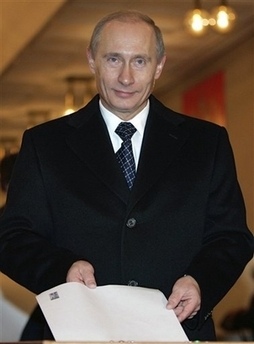Putin's party winning Russia election
Updated: 2007-12-03 07:03
MOSCOW - Vladimir Putin's party won a crushing victory in parliamentary elections Sunday, paving the way for the leader to remain in control even after he steps down as president.
|
|
The vote followed a tense Kremlin campaign to ensure victory for the United Russia party and for Putin, who has used a flood of oil revenues to move his country onto a more assertive position on the global stage.
"The vote affirmed the main idea: that Vladimir Putin is the national leader, that the people support his course, and this course will continue," party leader and parliament speaker Boris Gryzlov said after exit polls were announced.
But several opposition leaders accused the Kremlin of rigging the vote, and the Bush administration called for a probe into voting irregularities. Communist Party leader Gennady Zyuganov called the election "the most irresponsible and dirty" in the post-Soviet era.
With ballots from 64.4 percent of precincts counted, United Russia was leading with 62.8 percent, while the Communists trailed with 11.7 percent, the Central Election Commission said.
The Kremlin portrayed the election as a plebiscite on Putin's nearly eight years as president -- with the promise that a major victory would allow him somehow to remain leader after his second term ends next year.
Putin is constitutionally prohibited from running for a third consecutive term. A movement has sprung up in recent weeks to urge him to become a "national leader," though what duties and powers that would entail are unclear.
Pollsters said United Russia's performance would give it an overwhelming majority of 306 seats in the 450-seat State Duma, or lower house. The Communists would have 57 seats.
Two other pro-Kremlin parties -- the nationalist Liberal Democratic Party and populist Just Russia -- also appeared to have made it into parliament, with 8.8 percent and 8 percent, respectively.
No other parties passed the 7 percent threshold for gaining seats in the legislature.
The Kremlin appeared determined to engineer a resounding victory. But Putin, credited with rebuilding Russia after the poverty and uncertainty of the 1990s, has support from many Russians.
"Today everything is clear and stable in life. The president's words always coincide with what he does. As for the other candidates we don't know yet where they would take us to," said Raisa Tretyakova, a 61-year-old pensioner in St. Petersburg.
The Bush administration Sunday called on Russia to investigate claims the vote was manipulated.
Turnout was about 62 percent Sunday, the Central Elections Commission said, up from 56 percent in the last parliamentary elections four years ago.
All seats will be awarded according to the percentage of the vote each party receives; in previous elections, half the seats were chosen among candidates contesting a specific district, allowing a few mavericks to get in. About 109 million people are eligible to vote.
The Organization for Security and Cooperation in Europe, regarded in the West as the most authoritative election monitor, canceled plans to send observers.
Putin claimed the pullout was instigated by the United States to discredit the elections. But the OSCE said Russia delayed granting visas for so long that the organization would have been unable to meaningfully assess election preparations.
|
|
|
||
|
||
|
|
|
|
